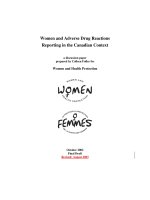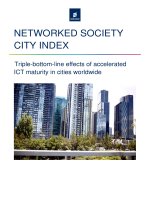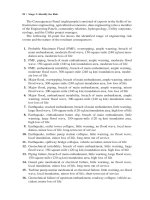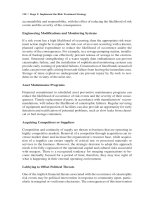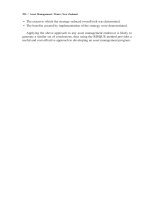Sustainability and triple bottom line reporting in manufacturing industry in Vietnam
Bạn đang xem bản rút gọn của tài liệu. Xem và tải ngay bản đầy đủ của tài liệu tại đây (1.81 MB, 25 trang )
Sustainability and triple bottom line reporting in
manufacturing industry in Vietnam
Hoang Thi Bich Ngoc
Outline
Literature Review
Lessons from others countries
Regression model
Recommendation
Limitation
Objectives and research questions
Objectives:
Explain why manufacturers and certain companies should issue TBL report
Research questions:
- What is TBL reporting?
- What are the factors affecting the decision of issuing Triple Bottom Line report
in Vietnam?
- What are recommendations for manufacturing companies and Vietnamese
government?
Literature review
Triple bottom line: is an accounting framework with three parts: social,
environmental (or ecological) and financial. (John Elkington, 1997).
Figure 1 Three bottom line factors
Planet
People
Profit
Source: Created by author
Literature review
CSR: Corporate Social Responsibility is the continuing commitment by business to
behave ethically and contribute to economic development while improving the
quality of life of the workforce and their families as well as of the local community
and society at large.
- The World Business Council for Sustainable Development-
Business benefits of TBL reporting
• Enhancement of reputation and brand;
• Securing a ‘social license to operate’;
• Attraction and retention of high caliber employees;
• Improved access to investors;
• Reduce risk profile;
• Identification of potential cost savings;
• Increased scope for innovation;
• Aligning stakeholders needs with management focus; and
• Creation of sound basic for stakeholder dialogue
Literature review
• Manufacturing:
The process of converting raw materials, components, or parts into finished goods
that meet a customer's expectations or specifications.
• Sustainable manufacturing:
The creation of manufactured products that use processes that minimize negative
environmental impacts, conserve energy and natural resources, are safe for
employees, communities, and consumers and are economically sound.
- the US Department of Commerce’s Sustainable Manufacturing Initiative-
Theoretical framework
• Legitimacy theory:
Legitimacy is a generalized perception or assumption that the actions of an entity
are desirable, proper, or appropriate within some socially constructed system of
norms, values, beliefs, and definitions (Suchman, 1995).
• Stakeholder theory:
suggests that companies will manage these relationships based on different
factors such as the nature of the task environment, the salience of stakeholder
groups and the values of decision makers who determine the shareholder ranking
process (Donaldson & Preston, 1995).
UK:
Lessons from others countries
• Treasury (Her Majesty's Treasury) issued guidance, minimum requirement.
• Award for sustainability reporting called Building Public Trust Awards.
• In 2013, 91% of companies published sustainability report (KPMG)
Australia
• 82 % of firms issuing report in 2013
• Heavy industry and resources-based sectors always has high rate of publishing report
=> In developed countries, TBL is popular. It is highly appreciated in high profile industry.
Source: KPMG International, The KPMG survey of
Corporare responsibility reporting,2013
Lessons from others countries
Thailand
• The growth in manufacturing sector caused the environmental crisis
•
In 1999, Thai listed companies were asked to promote and build corporate
governance practices into their annual reports
• In 2007, voluntary reporting was changed to a “comply or explain” approach due to
the inefficiency of the previous policy. However, Thailand does not have any
regulation requiring corporate environmental reporting.
=> In developing countries, TBL reporting is increasingly concerned as a tool for dealing
with environmental crisis
Overview of TBL reporting in Vietnam
• CSR concept was first introduced by transnational companies (Nguyen, 2007).
• In 2014, 28 companies in the top 50 companies in Ara Vietnam 2014 disclosed
non-financial data
• TBL report is still a voluntary report in Vietnam. The majority of TBL disclosing
companies are big corporation.
• With the growth in economy and manufacturing sections, Vietnam are facing
with environmental crisis (Like Thailand in 1990s)
• Today, TBL reporting is increasingly concerned in Vietnam, especially in the
manufacturing sector.
Relationship between TBL reporting decision
and factors
• Model: Probit and logit
• Reason: Probit and logit regression model is the nonlinear regression model
designed for binary dependent variables
• Factors:
- Company age
- Ranking in Ara Vietnam 2014
- Total debt
- Return on assets
- Total equity
- Type of industry
- Type of auditor
Table 1: Hypothesis
Variabl
e
Expected
gap
Theory
Previous research
author
Age
+/-
Stakeholder
Rank
+
Stakeholder
Debt
+
Stakeholder
and
legitimacy
Schipper (1981)
- High debt -> need to cut cost -> Increase chance to harm people and
planet -> Issue TBL to prove that they are social responsible
- Gain support from public to raise performance ->Pay debt
Equity
+
Stakeholder
Bammer and Pavelin 2008
- High equity -> Many stakeholder group -> provide information in
different aspect -> CSR
- Large company -> Excess money for CSR activities
ROA
+
Stakeholder
King and Lenox (2001),
Mathur (2000), Suttipun
- Good performance ->spare money -> Do CSR
Type of
industry
+
Stakeholder
Newson & Deegan(2002)
- High profile industry -> more negative impacts on People and planet ->
Need to prove that these impact are still acceptable -> TBL
Type of
auditor
+
Stakeholder
Brammer and Pavelin
(2008), Suttipun (2012)
Reason
- Old company -> diversify business and various stakeholders -> need to
provide information in various aspects -> TBL
- Good performance ->spare money -> Do CSR
- Company use big 4 auditor normally have good financial condition ->
have money for CSR and issue TBL report
Multiple Regression model
Table 2: Coefficients in Probit and Logit model
Variables
Coefficient
Standard error
p>|z|
Rank
-0.0136
0.0212
0.532
Age
0.0122
0.2252
0.588
Debtm
-0.0188*
0.0104
0.07
Equitym
0.2574**
0.1318
0.05
ROA
0.1007*
0.056
0.072
1.7206***
0.6691
0.01
0.0962
0.5816
0.864
Manufacturing
Big4
In which:
*is the significant level at 10%
** is the significant level at 5%
*** is the significant level at 1%
Source: Illustrated by author
Table 3: Regression model result
Variabl
e
Expected Result
sign
sign
Significant
Meaning
Age
+/-
+
Insignificant
Age of companies does not have significant impacts on TBL
reporting decision.
Rank
+
-
insignificant
Ranking of companies does not have significant impacts on TBL
reporting decision.
Debt
+
-
Significant
High debt amount companies tend to keep secret about their
non-financial information.
Equity
+
+
Significant
The higher equity amount company tends to lead to
sustainability reporting.
ROA
+
+
Significant
well-performed companies tend to be willing for sustainability
reporting
Type of
industry
+
+
*significant
Companies operating in manufacturing industry tend to issue
sustainability report.
Type of
auditor
+
-
Insignificant
Type of auditor does not have significant impacts on TBL
reporting decision
Table 4: Result explanation
Variabl Result
e
sign
Significant
Reason
Age
+
Insignificant
Young company has been aware about CSR and TBL reporting while in
some old companies CSR is not focused activities
Rank
-
insignificant
Ranking criteria is complex (performance, activities,…)
Debt
-
Significant
High debt companies want to hide non-financial information. They do
not want to use money for CSR and TBL reporting when in loss situation
Equity
+
Significant
High equity means they need to use TBL report to inform to stakeholders
in various aspects
ROA
+
Significant
Good performance companies have nothing to hide. They use TBL report
to gain public trust.
Type of
industr
y
+
*significant
Manufacturing companies disclose TBL report to ensure their impacts
are still at acceptable level
Type of
auditor
-
Insignificant
Vietnamese companies still use Big 4 auditors to gain creditability of
information. They have not focus on sustainable report.
Recommendation
For government
- In long-term government should issue a guideline for Triple bottom line
reporting in Vietnam
- Regular verifying the true and fair of non-financial data by an independent
organization
- Manufacturing industry and other highly sensitive industries should be legally
required to establish triple bottom line report.
Recommendation
For Vietnamese companies
-Vietnamese companies should use GRI guidelines and Sustainability reporting
handbook issued by IFC as the framework for TBL reporting
-High debt companies are suggested to be more open with non-financial data as it
support them to gain the credit from creditors and avoid bankruptcy when
stockholders are pessimistic about the current financial situation.
-Good performance companies should issue TBL report to advertise their CSR
activities to public.
Recommendation
For manufacturers
In short term
- Manufacturers are recommended using Big4 auditor to gain information
credibility as well as use Big 4 auditor and consultant in TBL reporting.
- Manufacturers are highly recommended issuing TBL report to gain trust and
support from the public, then increase sales and performance.
Recommendation
For manufacturers
In long term
- TBL report itself does not make company develop sustainably. Only when a
company operate ethically, would they gain long-term achievement.
- Manufacturers should set up their own codes of conducts and requirements
in the working environment to avoid negative harms to environment and
people, cut down the waste and increase efficiency.
Limitation
Example 1: 1000 tons of waste were landfilled in the farm
of director of Environment company at Ha Tinh province
Subjective reasons
Vietnam corruption perception index: Rank 112/168,
Score 31/100
Institutions of the socialist-oriented market economy
According to a study of William S.M (1999) culture and
the political and civil system were the determinants of
the amount of disclosure.
=> The creditability of information is still questionable
=> Result did not show pattern in some variables.
Example 2: Vietcombank (rank 16th in Ara Vietnam 2014)
did not issue TBL report but is ranked at 11th place in the
Best 100 Vietnam working place.
Binh Minh plastic (Rank 11th in Ara Vietnam 2014)
disclosed TBL report but the working place does not belong
to the Best 100 Vietnam working place
Limitation
Objective reasons
- Due to the limitation in time and budget, author cannot access the information
source of General Statistics Office of Vietnam as well as cannot conduct interview
with specialists.
Thank you for listening!
Additional references
1. Williams, S. M. (1999). Voluntary environmental and social accounting disclosure practice in the AsiaPacific region: an international empirical test of political economy theory. The International Journal of
Accounting, 34(2), 209-238.
2. Muttanachai Suttipun & Patricia Stanto (2012), Determinates of Environmental Disclosures in Corporate
Annual Reports of the Stock Exchange of Thailand (SET) ,Journal of Management Studies, School of Business
and Management, Faculty of Business and Laws, The University of Newcastle, Callaghan Campus, Australia.
3. />4. />

